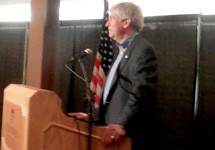MLUI / Articles from 1995 to 2012 / Snyder Supports Local Food, Renewable Energy Production
Snyder Supports Local Food, Renewable Energy Production
Speech emphasizes positives, ignores own party’s pushback
April 19, 2011 | By Glenn Puit
Great Lakes Bulletin News Service
 | |
| MLUI | |
| Governor Rick Snyder told a rural development conference there should be no conflict between business growth and protecting the environment. |
THOMPSONVILLE—Michigan Governor Rick Snyder made an appearance at the Rural Development Conference at Crystal Mountain today and endorsed both the local food movement and Michigan’s renewable portfolio energy standard.
During an address focusing on how to stimulate economic development in rural communities, Governor Snyder took special notice of the effort to facilitate locally grown produce. He said he believes the “grow local” food movement is an important part of rebuilding the state’s economy and supporting Michigan’s agricultural industry.
“Agriculture has been an overlooked community; it hasn’t gotten the credit and success it’s due for its success,” Mr. Snyder said. “If you step back and look at Michigan during these very difficult years, there is one area that has been doing very consistently well—growing, reinvesting, and contributing to our economy—and it’s agriculture.”
“I believe it’s also an opportunity and we can do more,” the governor added. “One way is the whole concept of buying local. How do we get it more integrated into our local economy, in terms of saying we are the second most agriculturally diverse state in the country? How do we leverage that and benefit that...particularly in urban areas and our school districts? How do we make that happen?”
The governor did not mention a new push within the Legislature to require public schools to turn a profit on their food service, a rule that many “farm to school” advocates say could significantly hamper their movement.
Energy Progress, Pitfalls
In his speech, Governor Snyder also touched on Michigan’s renewable portfolio standard, which requires utilities in the state to use renewable sources for 10 percent of their energy by 2015. Governor Snyder said while the legislation isn’t perfect, he supports it.
“Energy is playing an important role in our economy,” Governor Snyder said. “We have a lot of opportunity and I think we are doing reason well on RPS. Is it perfect? No. But on the relative list of messed up things in our state, it is not on the target list.”
The governor’s remarks were made in the wake of reports that Michigan now has the nation’s fourth-largest solar manufacturing sector and boasts close to 240 firms engaged in either solar or wind energy manufacturing. His comments also come several months after Consumers Energy first confirmed that its wind energy program, meant to fulfill the state RPS, will produce energy more cheaply than a new coal-fired power plant, and then asked for permission to freeze its tiny solar-power pilot program, alarming solar manufacturers who warmly endorsed it.
The Republican governor also did not address calls from some within his own party to forbid Great Lakes wind power research or development, or a push by clean energy advocates to stop Wolverine Power Supply Cooperative from building a large, coal- and petroleum coke-fired power plant in Rogers City that a state agency says would boost customers’ electric bills by 60 percent.
Instead, Mr. Snyder delivered a positive, controversy-free message.
“Energy is providing an opportunity...and one of the things that has been good for the state has been natural gas leasing...which is filling up the natural reserve trust fund due to the amount of leasing,” the governor said.
Those remarks, however, were made against a backdrop of growing concern that state regulation of deep underground hydro-fracking to extract formerly unrecoverable natural gas needs significant strengthening.
No Conflict
He also urged those in attendance to stop viewing environmentalism and business interests as competing ones. He said the important thing is to recognize that the state’s natural resources are perhaps the state’s greatest asset, and that economic development and protecting natural resources should compliment one another.
“We’ve had a silo mentality—it’s either about economics or it’s about environmentalism,” Governor Snyder said. “Well, we need to break thru on that. They are part of the same thing; we need to respect them both. We need to marry those concepts together and merge them.”
Glenn Puit is an energy specialist for the Michigan Land Use Institute. Reach him at glenn@mlui.org.





